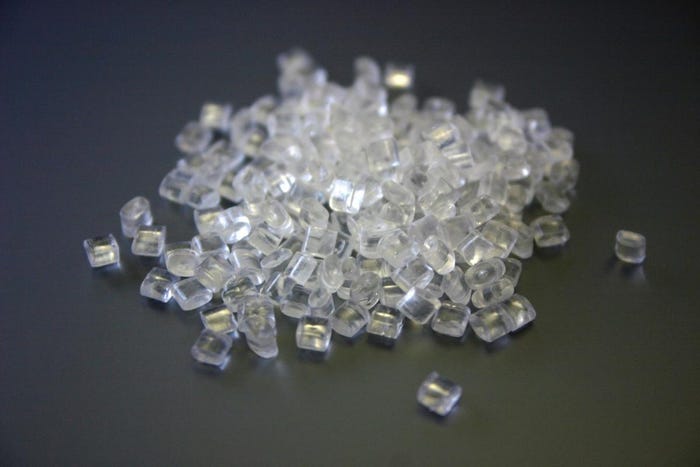Specifically engineered for molding devices with extremely thin walls and long flow lengths, this new polycarbonate grade is a high-flow one with an internal mold release that helps ease removal from an injection mold of parts processed with it. This material is expected see use in applications such as trocars, needle safety guards and other medical devices requiring thin walls and complex components.
June 14, 2011
Specifically engineered for molding devices with extremely thin walls and long flow lengths, this new polycarbonate grade is a high-flow one with an internal mold release that helps ease removal from an injection mold of parts processed with it. This material is expected see use in applications such as trocars, needle safety guards and other medical devices requiring thin walls and complex components.
Makrolon 2258 polycarbonate (PC). |
Bayer MaterialScience's high-flow polycarbonate, Makrolon 2258. |
Marketing and supplying the new grade is Bayer MaterialScience LLC, one of the world's largest suppliers of polycarbonate. Processors of parts with walls as thin as 0.014 inches and flow lengths up to 150 millimeters can make use of the material to reach such dimensions, according to the supplier.
Regarding the new grade, Bruce Fine, market segment leader, medical and consumer products, Bayer MaterialScience LLC, commented, "Introducing this new material is indicative of our commitment to meeting the evolving needs of the medical market."
This material allows for ethylene oxide and steam sterilization at 121°C and meets many ISO 10993-1 biocompatibility test requirements, reports Bayer. It is currently available in the United States and Europe. Fine told PlasticsToday that the company released the material in response to its customers requests.
"Bayer MaterialScience is responding to the needs of designers to take weight out with thinner and thinner walls," Fine said, "and this product is a direct response to that." The grade is Bayer's highest flow PC, 35-40 MFR, that's suitable for medical.
In related news, Bayer MaterialsScience also has introduced three new grades to its medical thermoplastic polyurethane (TPU) product line. The new TPU medical grades, which are all commercially available, extend the hardness range of the supplier's TPU product portfolio. The three grades are marketed as Texin RxT70A , Texin RxSTX120 and Texin RxHM125.
Tim Jacobs, the TPU market channel manager for Bayer, told PlasticsToday the grades include the company's softest polyether medical grade, meeting all biocompatibility and ISO standards. "Where in the past we had an industrial grade," Jacobs said, "we found a market need where people want softer grades that meet that biocompatibility." Jacobs said it will also bond with a number of materials typically used for rigid housing substrates, including PC, ABS, and nylon.
Texin RxT70A TPU is a plasticizer-free resin said to offer good hydrolysis, low temperature flexibility, and high moisture vapor transmission rates. Typical medical applications include catheters and catheter balloons, specialty tubing and profiles. It is the softest TPU in Bayer MaterialScience's product range. Added Gary Sandhu, sales and marketing manager, TPUs for NAFTA, "This grade of Texin resin gives molders and OEMs a plasticizer-free material that offers better adhesion to a variety of substrates, such as nylon, polycarbonate and PC/ABS."
The supplier also introduced two harder, high-modulus grades of Texin TPU. Texin RxHM125 has a Rockwell hardness of 125 (87 Shore D) - the hardest of the new grades - and a flexural modulus of 330,000 PSI. It has a slight amber hue that can be tinted to provide a custom-color clear tint.
Texin RxSTX120 is an opaque TPU that offers greater impact properties than the others. Both of these high-modulus TPU grades are suited for medical applications including connectors, clips, luers, equipment housings, stopcocks and fittings. Injection molding and extrusion grades of all three are available.
Jacobs said that the previous softest medical material available was 85 Shore A, with the new introduction down to 70 Shore A. He noted that if you go softer than 70 Shore A, the material is typically not 100% urethane and been alloyed or plasticized. Jacobs said that the new grade actually has improved moisture vapor transmission rates (MVTR), resulting in breathability well suited for wound-care films.
About the Author(s)
You May Also Like



